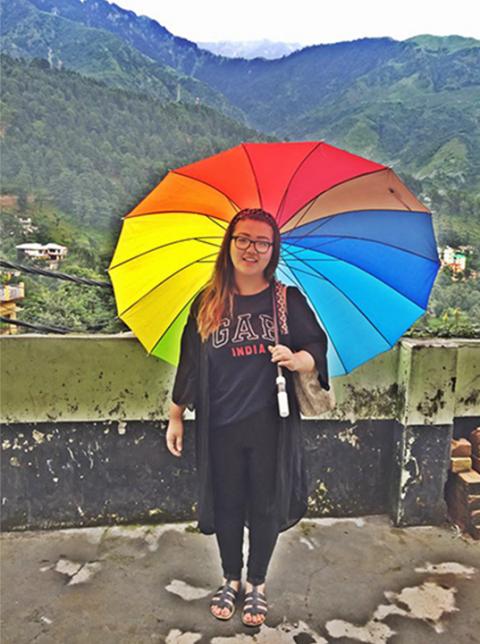Campus Life News
Attending college can result in many challenges for students. The list is long at times: being away from family, the intense course load, living with other people, and managing time between work and study. The list can go on, but either you embrace your new situation or let life overwhelm you.
Challenges in life are very familiar to junior public relations major, Tenzin Tseyang (pronounced say-YOUNG). It all started in Tibet, a mountainous region in southwest China, where Tenzin’s family originated. According to some scholars, Tibet had been a sovereign state for hundreds of years until Communist China invaded the Buddhist affiliated region in 1950. After the Tibetan uprising in 1959 many people fled Tibet, including the current 14th Dalai Lama. During the years of exile, which is still occurring, many Tibetans took refugee in neighboring India and Nepal.
Tenzin’s life seemed fairly normal as a young school-aged girl living in a Tibetan community in the Karnataka region of southwest India. She lived with her mother and grandparents in a relatively peaceful environment at a refugee settlement. Here Tibetans were able to practice Buddhism in freedom away from the persecuted environment of Chinese rule.
Her life started to change at the age of seven when her mother moved to the United States in pursuit of a better life. “My mom had the highest education in the family with a high school degree. She had seven siblings who had families too, so she went to the United States to get a better job for the whole family,” said Tenzin.
Tenzin stayed behind to live with her grandmother while her mother pursued the American dream. While living without her mother seemed lonely at times, her grandmother took on many roles for her while she was living and being educated in India.
Tenzin’s life made another turn when she was 12 years old and her mother sent for her to live with her in the New York City area. The fifteen hour plane trip was daunting, but the excitement of seeing her mother again created anticipation too great to compare.
Despite the exhilaration of being reunited with her mother, she was a stranger in a very different country. Finding Tibetans like herself was difficult; she didn’t even now English. She was now under the careful eye of her mother, who had lived and worked in the United States for five years.
Tenzin explained, “I started school in America in 5th grade in a public school in Oyster Bay. I was in an ESL (English as a Second Language) classroom. Tibetan was spoken at home. I knew Hindi, but English was becoming my third language.”
She was beginning to be accustomed to living on Long Island in the cottage house that belonged to her mother’s employer when they had to move. Tenzin’s mother was a babysitter for the family’s children, but the family was moving to Australia and they wanted Tenzin and her mother to come live with them. Mother and daughter decided to remain in the United States and find a home of their own.
They found their new place in Queens, NY. The two of them lived in a studio apartment and shared a bed to save money. Besides her mother trying to save money for her future there was outside pressure Tenzin received growing up in New York City.
Trying to maintain a balance between her two cultures was difficult to say the least. She described how her mother always told her when she was young, “Don’t be Americanized. Don’t act American.” Now, knowing that Tenzin is living five hours away from home at college her mother will tell her, “Blend in.”
Since stepping onto this campus in the summer of 2014 as an EOP (Educational Opportunity Program) student, Tenzin has carved a place for herself on campus. She has become involved with many on-campus clubs and organizations that have allowed her to take on many roles and be acquainted with the university as a whole.
Her first-year, she was active in the ALANA (Asian Latino African American Native American) Conference. She was in a fashion show scene and was on the planning committee. By her second year, she was on ASA’s (Asian Student Association) e-board, LSU’s (Latino Student Union) committee leader, and vice president of ASA’s active cultural planning committee. Currently, she is the student involvement project assistant for The Point and the president of ASA.
Tenzin is so connected to campus, “I meet people by getting involved, and by meeting faculty, so I know about jobs on campus. Other students on campus don’t make that connection.”
Being active outside of the classroom helped Tenzin become comfortable within her own skin. She will always take the time to educate someone about who she is; people sometimes make quick assumptions about her. She told of a recurring situation of when someone finds out she likes hip-hop. They say, “You are pretty cool for an Asian.” Tenzin would come right back and explain, “I am from Queens!”
She never gets bitter about other’s assumptions. She draws her strength from telling her story. This past September during the ALANA conference she gave a presentation on “Free Tibet.” Tenzin was able to explain her heritage and the ongoing battle that Tibetans experience living in China.
People are never going to understand who you are or where you are from, unless you tell them. Educating someone breaks down many preconceived notions.
Tenzin would like to tell others, “Take pride and educate others of your culture and your background. Join an organization and take advantage of every opportunity that SUNY Oswego offers and make sure to apply that into your journey here in college and after.”
Kelly V. Perkins



